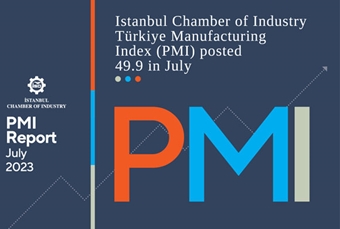News
ICI Released July 2023 Türkiye Manufacturing PMI and Türkiye Sector PMI Report
- 01.08.2023
- News

Istanbul Chamber of Industry Türkiye PMI dipped fractionally below the 50.0 no-change mark in July. The index fell to 49.9 in July from 51.5 in June, signalling broadly stable business conditions and the end of a six-month sequence of expansion. The stop in the sector’s growth was mostly caused by inflationary pressures as mentioned by the respondents. The input costs inflation accelerated sharply for the second consecutive time, the highest since March 2022.
According to the results of the Istanbul Chamber of Industry Türkiye PMI July report, the input costs inflation accelerated for the second month running in all the 10 sectors monitored under the scope of the report and cost pressures intensified in most of the sectors. The fastest increase in input prices and finished product prices was seen in food products sector and wood and paper products sector, respectively. New orders increased only in food products while textile products and main metals saw a significant decrease. Only 3 out of 10 sectors had a growth in output, namely electrical and electronic products, clothing and leather products and land and sea vehicles. Manufacturers increased their staffing level in general.
The July 2023 results of the Istanbul Chamber of Industry (ICI) Türkiye Manufacturing PMI (Purchasing Managers’ Index) survey, the fastest and reliable reference recognized in manufacturing industry performance was released. According to the results of the survey where any figure greater than 50.0 indicates overall improvement of the sector, the headline PMI dipped fractionally below the 50.0 no-change mark in July. The index fell to 49.9 in July from 51.5 in June, signaling broadly stable business conditions and the end of a six-month sequence of expansion.
The end of the run of growth in the sector was often attributed by firms to strengthening inflationary pressures. The pace of input cost inflation accelerated sharply for the second month running in July and was the fastest since March 2022. More than half of all respondents (52%) indicated that their input prices had risen over the month, which they often linked to currency weakness. There were also some reports that higher wages had added to overall input costs. In turn, output prices were also raised, with the pace of inflation at a 16-month high and well above the series average.
Stronger price pressures weighed on customer demand in July, leading to a first slowdown in new orders in five months. Similarly, new business from abroad also moderated. The impact of price rises on demand was also felt in terms of production as a four-month sequence of growth came to an end. That said, a continued recovery from the earthquake earlier in the year meant that output was broadly unchanged overall. Employment increased for the third month running as firms attempted to expand capacity, although the pace of job creation was only slight. Meanwhile, manufacturers scaled back their input buying in response to softer new order inflows. Reduced demand for inputs, coupled with delays in the delivery of items from suppliers, meant that stocks of purchases were scaled back to the largest extent since May 2020.
Commenting on the Istanbul Chamber of Industry Türkiye Manufacturing PMI survey data, Andrew Harker, Economics Director at S&P Global Market Intelligence, said:
“Resurgent price pressures dampened demand for Turkish manufactured goods in July. Both input costs and selling prices rose at much stronger rates at the start of the third quarter, making it harder for firms to secure new business. As a result, a four-month sequence of production growth came to an end.
Manufacturers will be hoping that inflation starts to level off again to aid in the pursuit of new business.”
Input costs inflation accelerated again in the sectors
July report of the Istanbul Chamber of Industry Türkiye Manufacturing PMI showed that the increased inflationary pressures throughout the Turkish manufacturing industry in the first month of the third quarter limited both demand and output in most of the sectors.
The input costs inflation accelerated for the second month running in all the 10 sectors monitored under the scope of the report and cost pressures intensified in most of the sectors. The fastest increase in input prices was seen in food products and the cost inflation reached the highest level since October 2018. In turn, output prices were also raised. The slightest increase in output prices was in chemical, plastic and rubber products sector while the highest increase in wood and paper products.
Increased sales prices negatively affected customer demand in general at the beginning of the third quarter. New orders increased in only the food products sector… strong but still slower than June. There was a significant decrease in new orders in textile and main metal sectors.
The outlook for foreign demand conditions was slightly more positive in July. New export orders increased in four sectors, led by food products. Output increased in three out of 10 sectors in July, as in June. The only sector which continued to grow was the electrical and electronic products sector. Output returned to the growth zone in clothing and leather products and land and sea vehicles sectors. The sharpest deceleration in output was observed in chemical, plastic and rubber sector. Despite the slowing demand conditions, manufacturers attempted to increase employment. Job creation rose in half of the 10 monitored sectors. The sharpest increase was seen in food products sector with a record high level in the job creation history of the survey. Purchasing activities however were somewhat positive, with only three sectors increasing their stock purchases. Especially the textile sector and the clothing and leather products sector experienced significant slowdowns.